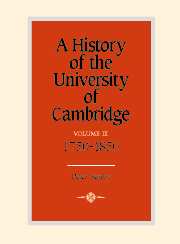Book contents
- Frontmatter
- Contents
- List of illustrations
- General Editor's preface
- Acknowledgements
- List of abbreviations
- Introduction
- 1 Townscape and university: topographical change
- 2 The university: its constitution, personnel, and tasks
- 3 Colleges: buildings, masters, and fellows
- 4 Colleges: tutors, bursars, and money
- 5 Mathematics, law, and medicine
- 6 Science and other studies
- 7 Religion in the university: its rituals and significance
- 8 The Orthodox and Latitudinarian traditions, 1700–1800
- 9 Cambridge religion 1780–1840: Evangelicalism
- 10 Cambridge religion: the mid-Victorian years
- 11 The university as a political institution, 1750–1815
- 12 The background to university reform, 1830–1850
- 13 Cambridge and reform, 1815–1870
- 14 The Graham Commission and its aftermath
- 15 The undergraduate experience, I: Philip Yorke and the Wordsworths
- 16 The undergraduate experience, II: Charles Astor Bristed and William Everett
- 17 The undergraduate experience, III: William Thomson
- 18 Games for gownsmen: walking, athletics, boating, and ball games
- 19 Leisure for town and gown: music, debating, and drama
- Appendices
- Bibliography
- Index
13 - Cambridge and reform, 1815–1870
Published online by Cambridge University Press: 05 April 2012
- Frontmatter
- Contents
- List of illustrations
- General Editor's preface
- Acknowledgements
- List of abbreviations
- Introduction
- 1 Townscape and university: topographical change
- 2 The university: its constitution, personnel, and tasks
- 3 Colleges: buildings, masters, and fellows
- 4 Colleges: tutors, bursars, and money
- 5 Mathematics, law, and medicine
- 6 Science and other studies
- 7 Religion in the university: its rituals and significance
- 8 The Orthodox and Latitudinarian traditions, 1700–1800
- 9 Cambridge religion 1780–1840: Evangelicalism
- 10 Cambridge religion: the mid-Victorian years
- 11 The university as a political institution, 1750–1815
- 12 The background to university reform, 1830–1850
- 13 Cambridge and reform, 1815–1870
- 14 The Graham Commission and its aftermath
- 15 The undergraduate experience, I: Philip Yorke and the Wordsworths
- 16 The undergraduate experience, II: Charles Astor Bristed and William Everett
- 17 The undergraduate experience, III: William Thomson
- 18 Games for gownsmen: walking, athletics, boating, and ball games
- 19 Leisure for town and gown: music, debating, and drama
- Appendices
- Bibliography
- Index
Summary
CONFLICTING ATTITUDES AND THE ELECTIONS OF 1826 AND 1831
‘The friends of freedom in Cambridgeshire have to contend’, wrote Weston Hatfield in his newspaper the Cambridge Independent Press in 1832, with ‘all the influence of the Aristocracy, the Church, the Squirearchy, and of every class of corruptionist’. With the foundation of the Independent Press in 1819 Weston gave a fresh hearing to the tradition once expressed by Benjamin Flower. He was the enemy of the Rutland interest in borough and county and of the oligarchical corporation it manipulated; he condemned the acts of repression, such as the suspension of Habeas Corpus in 1817, with which the government met the postwar slump and demands for parliamentary reform. Representing the militant Dissenters of Cambridge, Weston opposed the privileges of the Established Church in university and society and called for Catholic Emancipation. Another common radical demand that Weston voiced was for Corn Law repeal; though he recognised that in a farming area such as Cambridgeshire ‘our views on this subject may be somewhat unpopular among the class of society in which our paper perhaps most generally circulates’.
These views were opposed by the Cambridge Chronicle, the Tory newspaper in the region. The Chronicle also regarded itself as the university journal, carrying much news of Senate votes and anxious to guard the university's interests as Conservatives saw them.
- Type
- Chapter
- Information
- A History of the University of Cambridge , pp. 472 - 506Publisher: Cambridge University PressPrint publication year: 1997



